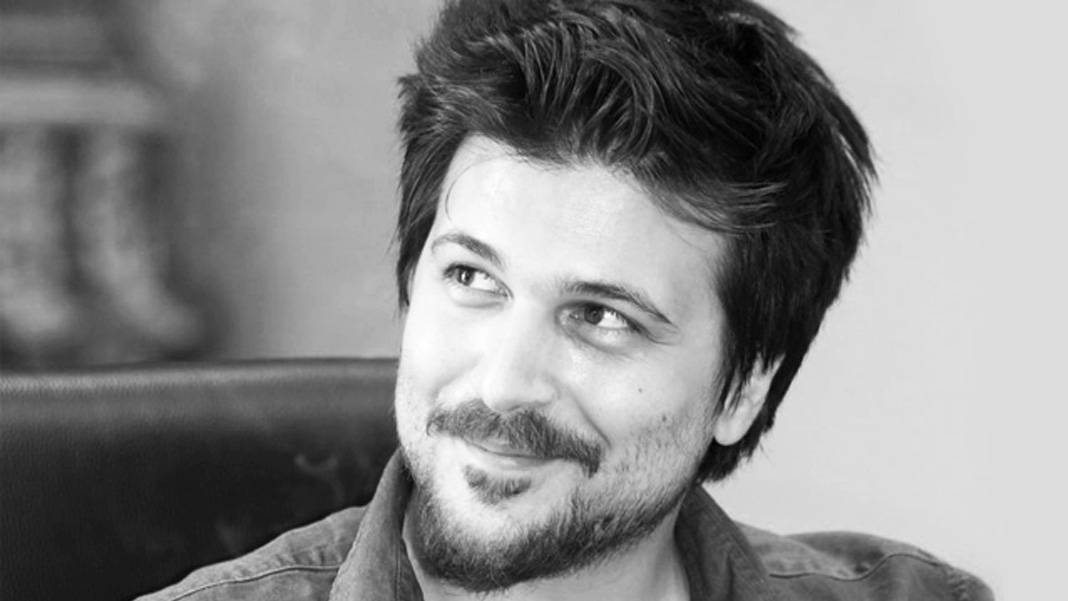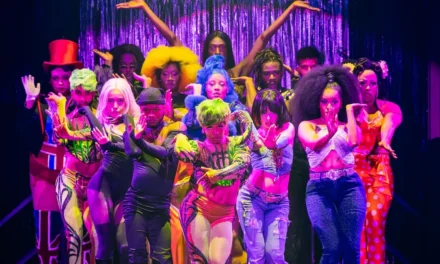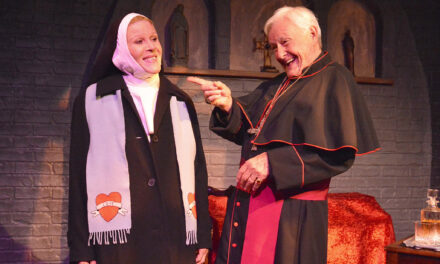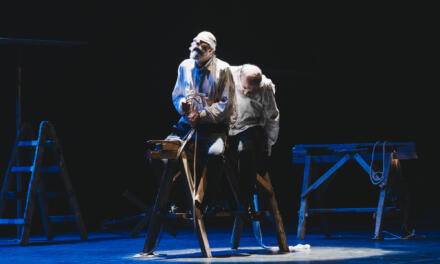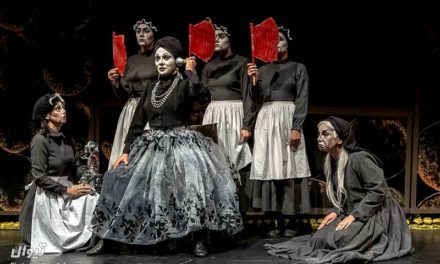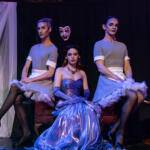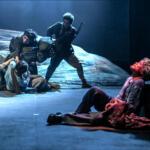He lived for 33 years, and then he left us. He had his first professional direction in the Zrenjanin theatre, where he staged Molière’s Don Juan. He directed 13 plays and started the fourteenth. They were: Von Kleist’s Tee Broken Jug (JDP Belgrade), Toller’s Hinkemann (ZKM Zagreb), Nušić’s The Bereaved Family (Slovensko ljudsko gledališče, Celje/Prešernovo gledališče, Kranj), Ödön von Horváth’s Tales from the Vienna Woods (Gavela, Zagreb), L.N. Tolstoy’s The Power of Darkness (National Theater Belgrade), Moliere’s The Misanthrope (HNK, Rijeka), Shakespeare’s Titus Andronicus (ZKM, Zagreb), Lorca’s Blood Wedding (City Theater Budva and SNP), Lessing’s Emilia Galotti (SNG Drama, Ljubljana), an author’s project based on Moliere’s play Tartuffe (co-production of the Serbian National Theater and the Sombor National Theater), Bacchae – a brief overview of disintegration based on Euripides’ The Bacchae (Bitola National Theatre), Ibsen’s Ghosts (Prešernovo gledališče, Kranj) and Fear – one warm human story, an author’s project inspired by the motifs of the work of Franz Xaver Kroetz (National Theater Pirot). Work on the project Crime and Punishment, Notes from Underground, based on Dostoyevsky, began while he was in the SNP, but the series of great theatre drections was abruptly cut there. The Serbian National Theater from Novi Sad, which was joined by the National Theatre from Belgrade, with a view of plays by this excellent and, above all, original theatre creator, with the event Igor’s Days offers the audience an opportunity from evening to evening to observe, assimilate, sanctify Torbica’s brilliant directorial actions.
This year’s Igor’s Days was opened by the play The Power of Darkness. We will make an introduction with a short presentation of this play, while the main interest and content of the text you are reading will be another play and direction by Torbica. The question of sensibility, as well as the development line of the director and his creative growth, transcending himself, made the selection.
The Power of Darkness
Lev Nikolayevich Tolstoy’s The Power of Darkness stands completely opposite to the Kingdom of Heaven. It is a dark and difficult story about urges, crimes, but also Christian fears. The play breaks down those moments when evil creeps into a person and irresistibly takes possession of him until it completely overwhelms him until the one and only remaining ray of fear tells him: “A person can hide from people, but not from God.”

The Power of Darkness directed by Igor Vuk Torbica, foto by National Theatre in Belgrade
In the direction of Igor Vuk Torbica, this drama unfolds gradually, through a chronological structure and sudden time jumps. One is separated from the other by the blackest darkness that dominates the transitions from scene to scene. Like thunderbolts, literary motifs break, burst and scatter in the director’s depictions of episodes full of evil, hatred, misery, misfortune and ruin. Torbica’s direction through Tolstoy’s work asks the audience the question: Is it worth doing anything? Create any condemnation? A man who has engaged in evil will never get out of it again. They will only go deeper and deeper into the abysses and deeps of sin.
Folk drama about a series of crimes committed due to fatal passions in the countryside, in the strong rhythm of powerful direction and church music, in front of the holy cross in the centre of a vacuumed room, positions the imprisoned actors, the representatives of the characters. Through moralistic thesis, life and psychological realism and method acting, an endless series of injustices are told and shown. The protagonists live in fear. Are they afraid of sin or God? Why? Because sin is added to sin. Because God does not give happiness. And because, in the end, God will turn everything around.
There are black weddings, there are bloody marriages, the actors are buried alive – everyone is chased like dogs. Life corrodes them or they are disgusted. Money is taken to the grave, tea is in the poison. A boiling samovar is smoked in front of sinful individuals. However, there is no law, fairness justice – equally for none. The smell of the sanctuary lamp, eternal flame stunned the entire theater. The last silent scream in the play is heard the loudest. The smell of a rotten order prevails, waiting for the “coming” freedom, an empire that does not know the beginning or the end.
Bacchae – a brief overview of disintegration
“‘Bacchae’s anger and rapture has a lot of prophetic power in it.”
The ancient tragedy of Euripides The Bacchae, with all its tasks, in the original superb direction, returned to modern stages and revived the ancient (contemporary) questions of divine supremacy, man’s destiny on earth and the impossibility of his own insights into it.

Bacchae – a brief overview of disintegration directed by Igor Vuk Torbica, foto by Bitola National Theatre
The concept of the play is complex. The prologue is told by the actress asking us the question of who we really are, if we can even know ourselves and if we even understand the true nature of visible reality. She, with the role of a girl suffering from schizophrenia in our time, who sees what others cannot and who no one understands, recounts to the audience the myth of Dionysus, how it all began, with an evil premonition where it will lead. The exposition introduces us to the birthday celebration of a president (of something? city, region, state?) of our time. He is wealthy, powerful, and infinitely self-confident. Happy birthday mister President (an allusion is made to the musical birthday greeting to Kennedy by Marilyn Monroe). At dinner, they discuss art, literature, and theatre, wondering if these arts have any meaning anymore. The president, the ruler is among his relatives and friends, all of whom are infinitely grateful to him, adore him and crown him with a laurel wreath, and at the height of the party, accompanied by the others, he sings My way by Frank Sinatra complacently. Until the moment when something that transcends man fills the space and begins to refract those present, opening their eyes and returning them to ancient times, to mythical times, to primordial inevitabilities, to the tragic processing of myth, to the eternal return. The celebrant is the only one blind because he does not even consider himself a mere mortal, he is the only one blind to see the obvious transformation.
This piece represents a sacrificial goat, a ram, a bull, a gift to the Olympian god Dionysus, Bacchus – Bromius, the god of wine, theatre, ecstasy, and madness. Dionysus’ nature, excessive in everything, is eager for frenzy and aggression, and he enters among mortals, accompanied by his dissolute companions. Here they come, they come, heralded by mystical rhythms: “Bacchae, Bacchae! Bromius, Bromius! There are charms. There is also desire. Celebrating that glory with Bacchaes is simple.” The tragic plot is in transition transforming from the present to a long-ago time reaching an unstoppable culmination.
The curse of the genus has already begun. History is written in tragic guilt, the fate of Cadmus’ descendants. The grandson of Cadmus, King Pentheus did not respect and believe in the twelfth, youngest god, Dionysus, an Olympian outsider, who only later joined the divine summit, when Hestia gave him his place. He was different from the others because he had a mortal mother, Semele, daughter of Cadmus. The sisters of the martyred Semele (Ino, Autonoë, and Agave) also did not believe that Zeus had impregnated Semele and that their son was a twice-born god. Here he is, he has arrived (when Pentheus is at his peak), he has come to seduce his cult and punish his mother’s family, who belittle and despise him, to demonstrate divine power before those who do not recognize him as a god. He says: “I, Dionysus, son of Zeus and king of Thebes, have returned, here to my native land… And here I stand, a forsaken figure of God, disguised as a mortal.”
According to Euripides, the god takes the form of a young man resembling a girl, with blond curls falling on his shoulders. In Igor Vuk’s play Torbica, the god will have a female form and will be played (lovely and powerful at the same time) by the actress Maja Andonovska Ilijevski, with long blond hair, a divine voice and stature, and gorgeous dance.

Bacchae – a brief overview of disintegration directed by Igor Vuk Torbica, foto by Bitola National Theatre
Trance and madness culminate. Suddenly, the Theban women are bewitched by the creator of mysteries, Bacchus, and go completely mad. They became bacchae, bromius. They left the city and climbed the hill. They dance, sing, and swing thyrsos decorated with ivy. In that round of exorcisms and a state of complete ecstasy, uncontrolled passion, along with all the Thebans and Cadmus’ daughters, Pentheus’ aunts, as well as his mother Agave, found themselves. Dionysus dresses Pentheus (whom he succeeded in bewitching, as well as all the others) in a woman’s dress (so that the nuns don’t tear him apart) and takes him to Kytheron, to see what they are doing there. He will be torn apart, his head will be torn off by his own mother, thinking that she is tearing off the head of a lion. Dionysus turns his celebrated wine into blood. Endless agony ensues. There is no end in sight to the brutal scenes, and what is happening that has long been predestined in the stars is happening. The curse continues, and we are too blind to see it. The choir fell silent. The madness has dissipated. Horror and monstrosity ensued. Deconstruction of the myth. What next? Where to? Does any path even lead to the land of the blessed? The epilogue is without words. A deafening silence.
Valentin Svetozarev’s monumental scenography is practical and fantastically designed, placed in a large box that can represent the walls of a home or the walls of Thebes. In the very centre, there is a sumptuous baroque chandelier under which there are tables and chairs, which constantly change the arrangement. Blagoj Micevski’s costume design collided two worlds, ancient and modern, into one new dimension. The music for the play, composed by Aleksandar Dimovski, is at times very suggestive, comes to the fore and prepares us for what is yet to happen. The acting ensemble of the National Theater from Bitola, whose first row includes the roles of Pentheus, Agave, and all the others, skilfully responded to the director’s requests. The role of Dionysus, the face of the woman, is definitely a big step forward. The play talks about the disintegration of man, family, theatre, gods, systems, ideals, idols… The intelligent and passionate direction raises questions about the past, present and future, politics, identity, humanity, and theatre. And didn’t the Cosmos become Chaos, so that everything could begin once again?! Igor Vuk Torbica says from eternity that everything is possible with faith in the theatre.
The play Don Juan based on Moliere’s play, “theatre – circus – variete”, the lovers’ conquests of a hypocrite and the confession of a cheater in sneakers, the first of Torbica’s directorial, will close the revue of the third Igor’s Days. Some of Igor Vuk Torbica’s plays are no longer in the repertoires of their theatre companies, so we watched Tales from the Vienna Woods in the form of a video recording. In some of the performances, the acting falls apart, and the exact, precise, filigree thread of the director’s idea is lost. But, in each of the performances, the director is still at the incredible height of his task.
This post was written by the author in their personal capacity.The opinions expressed in this article are the author’s own and do not reflect the view of The Theatre Times, their staff or collaborators.
This post was written by Emilija Kvočka.
The views expressed here belong to the author and do not necessarily reflect our views and opinions.

